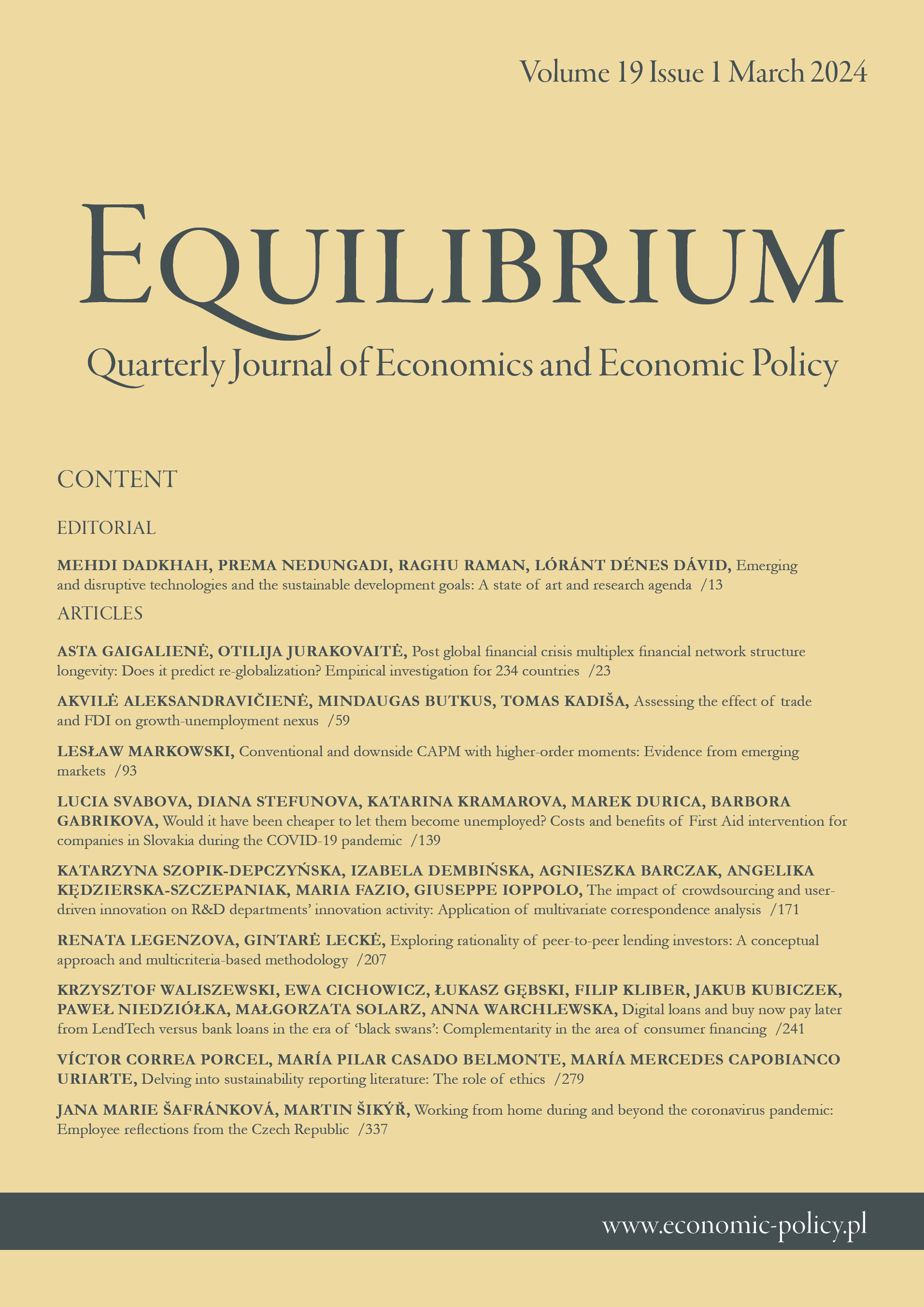危机时期外资实体在建立经济弹性方面的作用:以2019冠状病毒病大流行期间的欧洲数字和技术密集型公司为例
IF 6.2
Q1 ECONOMICS
Equilibrium-Quarterly Journal of Economics and Economic Policy
Pub Date : 2023-09-30
DOI:10.24136/eq.2023.024
引用次数: 0
摘要
研究背景:几十年来,外资实体(foe)已成为经济格局的重要组成部分,被认为是全球化的庞然大物,但也是技术或知识溢出等积极影响的传播者。在动荡和不确定的时代,企业对建设有弹性的经济的贡献是公共议程的重中之重。文章的目的:文章的目的是双重的。首先,我们测试了敌人在这个充满波动性和不确定性的紧张时期的表现。其次,我们考察了数字和技术密集型行业对韧性的贡献。方法:本研究利用Bureau van Dijk (BvD) Orbis公司层面数据库作为主要数据源。结果是通过使用两种计量经济学方法得出的。首先,我们利用普通平方估计量估计一个静态模型。其次,我们使用两步系统GMM估计器对方程进行重新估计。它将滞后的因变量引入模型,并通过包括工具(水平和差异)来实现协变量之间的内生性校正。的发现,增加值:我们将规模、年龄、所有权、杠杆率和无形资产作为公司财务绩效的决定因素,以及行业、国家和时间固定效应。与国内企业相比,海外企业的收入增长率更高。在危机时期,高科技和数字公司更具弹性。然而,所有权在这方面并不重要。我们致力于讨论敌人在危机和动荡时期所发挥的作用,在这些时期,复原力问题是议程上的首要问题。我们的研究旨在弥合敌人绩效,微观层面分析和弹性之间的差距。本文章由计算机程序翻译,如有差异,请以英文原文为准。
The role of foreign-owned entities in building economic resili-ence in times of crisis: The case of European digital and technologically-intensive firms during the Covid-19 pandemic
Research background: Over the decades, foreign-owned entities (FOEs) have become an important part of the economic landscape considered as behemoths of globalisation, but also transmitters of positive effects such as technology or know-how spillovers. In times of volatility and uncertainty, firms’ contribution to building a resilient economy is at the top of the public agenda. Purpose of the article: The purpose of the article is two-fold. Firstly, we test, how FOEs perform in this stressful time of volatility and uncertainty. Secondly, we examine the contribution to resilience by digital and technologically intensive sectors. Methods: The study utilises the Bureau van Dijk (BvD) Orbis firm-level database as a primary data source. The results are derived with the use of two econometric approaches. Firstly, we estimate a static model utilising the ordinary squares estimator. Secondly, we re-estimate the equations using a two-step System GMM estimator. It introduces a lagged dependent variable into the model and implements a correction for endogeneity among covariates by including instruments (in levels and differences). Findings & value added: We use size, age, ownership, gearing, and intangibility as firms’ financial performance determinants, together with the sector-, country- and time-fixed effects. FOEs compared to domestic ones generated a higher revenue growth rate. In times of crisis high-tech and digital firms are more resilient. However, ownership does not matter in this respect. We contribute to the discussion about functions performed by FOEs in crisis and turbulent times, in which resilience issues are on top of the agenda. Our research intends to bridge the gap between the performance of FOEs, micro-level analysis, and resilience.
求助全文
通过发布文献求助,成功后即可免费获取论文全文。
去求助
来源期刊
CiteScore
9.20
自引率
3.50%
发文量
28
审稿时长
36 weeks
期刊介绍:
Equilibrium. Quarterly Journal of Economics and Economic Policy is a scientific journal dedicated to economics, which is the result of close cooperation between the Instytut Badań Gospodarczych/Institute of Economic Research (Poland) and Polish Economic Society and leading European universities. The journal constitutes a platform for exchange of views of the scientific community, as well as reflects the current status and trends of world science and economy.
The journal especially welcome empirical articles making use of quantitative methods in: Macroeconomics and Monetary Economics, International Economics, Financial Economics and Banking, Public Economics, Business Economics, Labor and Demographic Economics, Economic Development, and Technological Change, and Growth.
Current most preferable topics and special issues:
The economics of artificial intelligence: business potentials and risks;
Digitalization and entrepreneurship in economics;
Sustainable socio-economic development, environmental and ecological economics;
Transition in the energy market (improving energy efficiency, alternative energy sources, renewable energy, energy security).

 求助内容:
求助内容: 应助结果提醒方式:
应助结果提醒方式:


